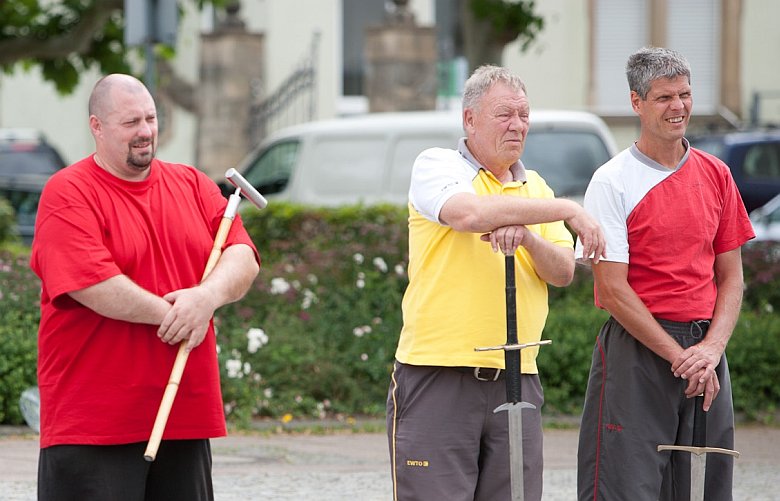|
September, 2008 Two Escrima Masters And Pioneers
A path is leading from the indoor gym at Langenzell Castle to the outdoor premises, through arches and continuing to finally reach a stairway, wrapped up in warm sunset light. The two masters of Escrima, Bernd Hoyer (5th Grade) and Thomas Dietrich (5th Grade), both in a really good temper, take the chance to joke around. WTW: Congratulations to the 5th Grade in Newman-Escrima. How was your journey from the beginnings up to this day? Thomas: I've been doing Escrima for 26 years and it's been a very exciting trip. I enjoy doing exciting things and that's what it's been, definitely. Not just year after year, but also week in and week out. Bernd: I'm doing Escrima for 14 years. Right after the very first 30 minutes I knew this is exactly what I was looking for and wanted to do. It was love at first sight and even up to this day I go to bed with my last thoughts about Escrima and wake up being the first thing on my mind. I'm not an Escrima pro, it's not my job but it has been a wonderful, exciting and sometimes stressful time. Partly even nerve-stretching. Thomas: Why are you looking at me right now? (Both look amused at each other and start to laugh. A sincere link between the two masters is obvious.) WTW: 26 years is a long time. How was your cooperation with René Latosa?
Bernd: Grandmaster René Latosa's seminars were much focussed on the stick. Whereas the Escrima I've learnt, i.e. the Escrima Grandmaster Bill teaches, has been focussing on the blade and can be transitioned to the stick. Not vice versa. WTW: Can you give us an example of such topics, that you discuss after the training sessions? Thomas: You look into Escrima. Not just the kind of Escrima at the gym but also how to conduct it in your private or work life. You take Escrima in, literally. You live Escrima just like any other Wing Tsun master does with WT. You learn to give in instead of standing firm. Of course, you also learn how to stand tall in front of someone, if necessary. I apply the basics of Escrima at work and at home with my family. Clearly, Bill Newman is my role-model and to some extent some kind of a father figure. In fact, no one helped me to advance except my friends and training partners. Those people are really important to me. Bernd: Like Thomas said, the mental aspects are very important. I worked my way up from a pieceworker to our department's vice superintendent, without bullying people verbally or physically, just by my behaviour and appearance, my target-oriented approach. This is pure Escrima: putting your focus onto a target and trying to reach that target. I've set up plans, built up my strategy to reach my targets. The industry and especially meetings, just to give an example, are like being in a battle. You try to defeat your opponent, rethorically. Thanks to Escrima, I'm keeping cool, even in heated situations. When I'm really stirred up, I'm thinking about Escrima and calm down immediately - without losing my temper in a meeting or getting abusive. If it wasn't for Escrima, I doubt I had reached that point, that kind of attitude. WTW: Are you two good friends or simply training partners?
WTW: What is your opinion on the direction Escrima took, how it evolved over the years? Bernd: That direction is just right. I can't think of anything better. Grandmaster Bill Newman took exactly the right path. His way of teaching, what he's teaching, how he sums up things, gets to the point, the essence of things. Just great. It's the best thing that could have happened to Escrima and how it eventually evolved into Newman Escrima. WTW: How does an Escrima Master excercise? What does your training look like? Thomas: We're doing exactly the same things as others do, on seminars for example. The first three student grades are about the basics, the foundation. Anything else you excercise later, improves these three programmes. That's about it. And, of course, transposing this knowlege, these skills to other weapons, working with different distances, learning different attitudes towards fights and how to fight. It's about finding your attitude of fighting in Escrima. People are different, have different preferences. For example, I can't use a heavy sword like Bernd does. Bernd: And I can't move as fast as Thomas can. Thomas: That's why we complement each other greatly. We're really good friends but once we excercise together, we're not. Bernd: No! Not at all! Thomas: It could happen that we turn really pale-faced. Like it did happen in Luebeck last time. It lasted about 15 minutes then we took an hour break. We had a hard time getting breath. But we didn't do anything different as anyone else at this seminar. WTW: Do you exchange your knowlege more theoretically or rather physical, hands-on?
WTW: What do you find so fascinating about Escrima? Bernd: Master Bill's perfect timing. He's taking a step just where you don't want him to step to and does exactly what you don't want him to do. That's beauty. Fighting is a thing of the past for me. I had a phase in my life where I wanted to excercise and wanted to fight. By now, I don't want to fight any more, to be honest. I've experienced and have seen so many things, while I was working as a bouncer for 11 years. I've fought enought fights in my life. Been there, done that. What I do like is to recognise an attack in its beginnings and then to scotch it. My opponent wants to attack me but I notice what he's up to and launch my counter attack. I crush him mentally and then he doesn't want to attack any more. That's fascinating. I'm going for a hunt. Period! Thomas: I'm fascinated by learning new aspects and facets, all the time. No matter how you call it, be it Wing Tsun, Escrima, or whatever. Every session I take, I realise some new weak spot, which takes me ages to get rid of. And while I'm at it, I find yet more weak spots. Because I'm doing this and because I'm excercising with any one who wants to, wasting no thoughts on "who's going to win? who's going to lose?" I can analyse moves. Who would have been in control right now? Who positioned himself strategically better? Why did I position myself rather unfortunately? That's what absolutely fascinates me. Similar to a game of chess, as in any other martial art. Taking your opponent's knights, conquering his colour, this is fascinating. WTW: What is your advise to youngsters who are interested in Escrima? Bernd: I don't accept underaged students. My nephew is 13 and I really do love him but I have never ever showed him anything from Escrima. And I won't, because boys at his age are emotionally and ethically not established yet. Their psyche is still developing. They're simply not ready yet to learn the essence of Escrima, or even stick with it, which only a few actually do. To me, that's too delicate. When someone has understood how Escrima is works, it doesn't matter what kind of object this person is using, holding in his hands. I really like ballet! As a kid I wanted to take ballet lessons. Just to get a solid posture and to learn a proper coordination of my body. However, since they didn't offer ballet in my neighbourhood, I joined the local wrestling club.
Bernd: (Bernd starts to laugh as well) Oh yeah, me doing Swan Lake, imagine that! But seriously, I consider it very important for young people to learn how to move and control their body, like in ballet. Thomas: There are a few basic approaches how to teach Escrima to youngsters. You have to be very careful though, what to teach kids and youngsters. You could take out the very essence, i.e. the self-defending aspects, much like in Kids Wing Tsun, and replace it with some "school for life", e.g. ethics and attitudes. Ever and anon I happen to see three rascals in my neighbourhood whacking each other with wooden swords. Magnificent. I'm still waiting for some serious hurtings but it just works out every time. However, I ask myself "could I teach those kids some useful things so they get at least some control over their actions, some coordination of their body and moves?". Wild chopping with a sword is dangerous. How can I teach those kids without emphasising self-defence, without teaching them "to survive by any means"? All it would take would be a simple school for life, just to make these kids better human beings. Posture and coordination is never a waste of time. I will elaborate on this topic one day, definitely. WTW: What do you tell people who consider Escrima of little interest, who claim they're unarmed most of the time anyway? Thomas: Anyone who's living in a house or an appartement has a key to their home. So, you're not really unarmed. Many of us are using a belt to keep their pants up or have a pen in their jacket. Women usually have a handbag with them when they leave the house. So, once again, you're not really unarmed. Finally, when I really don't have the slightest thing on me, I'm still with my own two hands. WTW: Is Grandmaster Bill still working on the development of Escrima or did he pass this responsibility on to the two of you? Bernd: Both. Master Bill is absolutely motivated and active. If Escrima would stop evolving, it would be a dead system. He's continuing to work on Escrima, but he's incorporating both of us heavily. He knows that there's things that I can do and Thomas can't and the other way round. We're working something out, then we present it to him. Master Bill is testing those things with and on us. Once he's content with it, we're introducing it. Thomas: Having said all that, we must not forget that everything that we test, everything we're trying to introduce, we have learnt from him. It's nothing that we came up with, it's always something he had shown us at one point in the past. We just pick these things up, analyse them and try to enhance them. That's an important point. Everything we use is from Grandmaster Bill Newman. And he's using things from his teachers etc. Every fight has been fought, we do not reinvent the wheel. You just have to be lucky to get things explained by someone who has understood it and knows how to pass this knowlege on. Someone who is able to explain this wheel to you. Once you have succeeded in doing so, it doesn't matter what you do. All things are alike. If you believe there's this rock-hard, massive block or a giant collission of two bodies, think again. Escrima can be soft as well. 100 percent. WTW: Many thanks for this sincere interview and I really hope we all will have much fun with Escrima, many more years. Bernd und Thomas: We will, rest assured.
Source translated by: The Navigator |
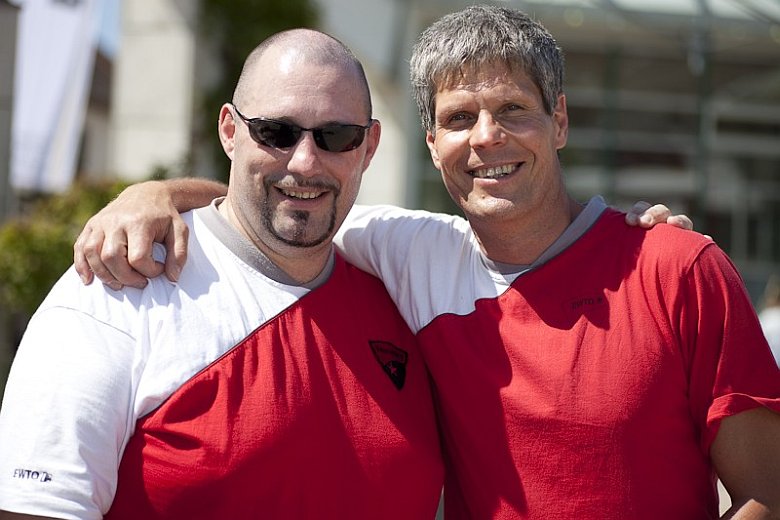
 Thomas:
Grandmaster Bill Newman prepared us for the seminars René Latosa
gave. He tried to give us the knowledge and munition to succeed, so
the cooperation with René was basically just a few corrections
by him here and there. I'm having a completely different relationship
with Grandmaster Bill Newman not just because we meet a couple of times
a year. It's those special discussions after the training sessions where
you can feel this tight link and realise it intensely.
Thomas:
Grandmaster Bill Newman prepared us for the seminars René Latosa
gave. He tried to give us the knowledge and munition to succeed, so
the cooperation with René was basically just a few corrections
by him here and there. I'm having a completely different relationship
with Grandmaster Bill Newman not just because we meet a couple of times
a year. It's those special discussions after the training sessions where
you can feel this tight link and realise it intensely.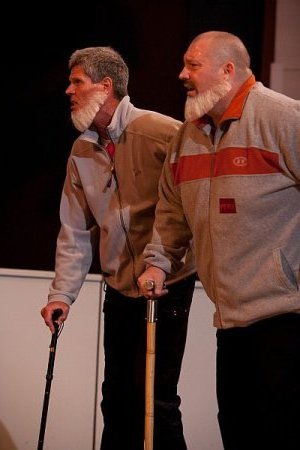 Bernd:
Now that's a long story. Back when I passed my 4th student grade, I
met Sifu Thomas Dietrich, today Master Thomas Dietrich, for the first
time (winking at Thomas). I liked him right off the bat, we were tuned
to the same wavelength. We shared the same kind of humour and a way
of thinking. Then we lost track of each other for years. My teacher
Sifu Tihomir Kolar didn't have a clue either, where to find Thomas.
A couple of years later, at a seminar in Frankfurt, I was standing in
front of the gym when Thomas walked around the corner, staring at me.
We were both staring at each other and got all excited about this coincidence.
From that day on, we made sure not to lose sight of each other again,
in which we succeeded. What started as a plain teacher/student relationship,
turned out to become a solid friendship, and of course, a training partnership.
(A friendship which is easy to notice, full of self-irony, charm and
humour.)
Bernd:
Now that's a long story. Back when I passed my 4th student grade, I
met Sifu Thomas Dietrich, today Master Thomas Dietrich, for the first
time (winking at Thomas). I liked him right off the bat, we were tuned
to the same wavelength. We shared the same kind of humour and a way
of thinking. Then we lost track of each other for years. My teacher
Sifu Tihomir Kolar didn't have a clue either, where to find Thomas.
A couple of years later, at a seminar in Frankfurt, I was standing in
front of the gym when Thomas walked around the corner, staring at me.
We were both staring at each other and got all excited about this coincidence.
From that day on, we made sure not to lose sight of each other again,
in which we succeeded. What started as a plain teacher/student relationship,
turned out to become a solid friendship, and of course, a training partnership.
(A friendship which is easy to notice, full of self-irony, charm and
humour.)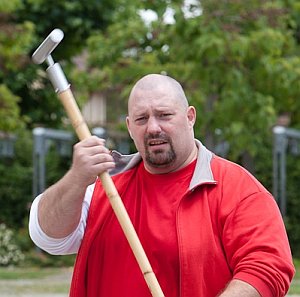 Bernd:
There's no theory without practical experience and vice versa. They
accompany each other, like the cog wheels in a gearbox. My training
used to be very hands-on. I excercised seven days a week, 90 minutes
sessions each. Then one day, I started to train less physical. I sat
down in front of a pad of paper, grabbed some pencils along with a set
square and tried to understand the geometry of Escrima. I'm working
as an engineering technician, which is a very practical job. Once I
understood something geometrically, I knew I've understood the whole
thing. Let's take, for example, the "V Theory". Why does that
work? In the meantime I had to cut down my practical excercises, unfortunately,
due to the lack of training partners. If I get a chance to meet with
Thomas and we manage to get 10 minutes for ourselves, we excercise intensly.
Those 10 minutes are so intense, that I live on them for two or three
months. He shows my weak spots to me, the gaps, that I don't recognise
any more. The gaps that my students, and they're really good students,
like Sascha Böhringer (4th TG) or Falk Welker (3rd TG),
don't see either. But Thomas does and shows them to me. Master Bill
shows them to me as well, but so quickly, that I don't realise it (laughing).
Bernd:
There's no theory without practical experience and vice versa. They
accompany each other, like the cog wheels in a gearbox. My training
used to be very hands-on. I excercised seven days a week, 90 minutes
sessions each. Then one day, I started to train less physical. I sat
down in front of a pad of paper, grabbed some pencils along with a set
square and tried to understand the geometry of Escrima. I'm working
as an engineering technician, which is a very practical job. Once I
understood something geometrically, I knew I've understood the whole
thing. Let's take, for example, the "V Theory". Why does that
work? In the meantime I had to cut down my practical excercises, unfortunately,
due to the lack of training partners. If I get a chance to meet with
Thomas and we manage to get 10 minutes for ourselves, we excercise intensly.
Those 10 minutes are so intense, that I live on them for two or three
months. He shows my weak spots to me, the gaps, that I don't recognise
any more. The gaps that my students, and they're really good students,
like Sascha Böhringer (4th TG) or Falk Welker (3rd TG),
don't see either. But Thomas does and shows them to me. Master Bill
shows them to me as well, but so quickly, that I don't realise it (laughing).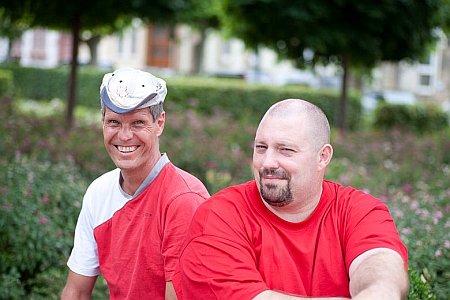 Thomas:
Bernd, I'm having a vision of something right now. Something in pink.
(laughs)
Thomas:
Bernd, I'm having a vision of something right now. Something in pink.
(laughs)